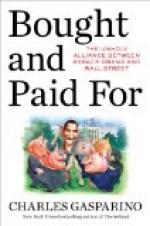The Christian name dropped as gingerly out of his mouth as if it had been a hot potato. At last he had summoned up courage enough to do what it had long been his ambition to do—call his employer by his first name. He felt it would be a victory for him—a triumph over the other men at the office to be on such terms of intimacy. Besides it was his right. Wasn’t he in the family?
Stafford turned quickly. There was a limit of endurance even to this clown’s impudence.
“What’s that?” he demanded curtly.
Not abashed and encouraged by the railroad promoter’s previous good nature, Jimmie stood his ground and spoke up boldly:
“I said, I wasn’t sure that we ought to accept presents even from you, Robert.”
Quickly Stafford raised his hand. Coldly and distantly he said:
“Just a minute. To my wife I am—Robert. To my wife’s sister I am—Robert. But to you I am—Mr. Stafford—even when I’m drunk.”
Somewhat taken aback at this unexpected rebuff, the young man tried to bluff it out. Raising his voice, he protested:
“You call me Jimmie—you don’t even call me James!”
“So I do,” laughed the millionaire, who never remained in a bad humor long. It was beneath him to bandy words with his employee. The fellow was impertinent, but what of it? He simply did not know any better.
Fanny, who had been an anxious observer of the little passage at arms, spoke up. Turning to her husband, she said quickly:
“That’s very different—”
“How?” demanded Jimmie, with an air of offended dignity.
“In every way,” replied his wife, making dumb signs to him to desist.
But the clerk was not to be silenced so easily.
“I don’t see it,” he said doggedly.
The master of half a dozen railroad systems made a low bow to his employee. With mock courtesy he said:
“You’re right! You’re quite right! I have been entirely too familiar and I beg your pardon. From now on I shall be most careful to address you always as—Mr. Gillie.”
Jimmie looked considerably crestfallen.
“You needn’t rub it in,” he said, shifting uneasily on his feet.
“No idea of such a thing,” went on the millionaire in the same tone. “Just one gentleman to another—’Mr. Stafford’ and ‘Mr. Gillie.’ That’s perfectly fair.” Turning towards his wife, who had apparently paid no attention to the discussion, he said: “Don’t you think so, Virginia?”
“Yes,” she answered shortly, without looking around.
Leaving the others, Stafford walked unsteadily over to where his wife was sitting. Bending over her, he exclaimed admiringly:
“My! You do look sweet to-night.” Appealing to his clerk, he said: “Doesn’t she? Doesn’t she, Jimmie—James—I mean Mr. Gillie?”
“I think we had better say good-night,” said the young man coldly.
“Yes, indeed,” chimed in Fanny, rising and making preparations to retire for the night.




